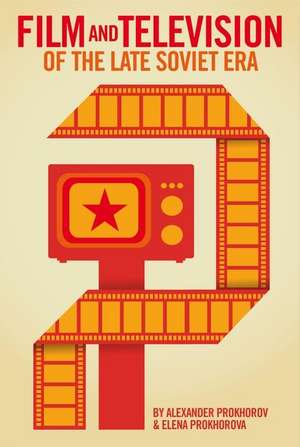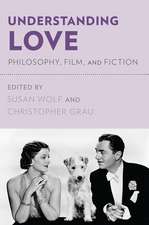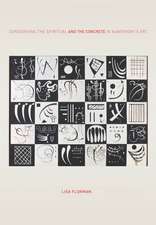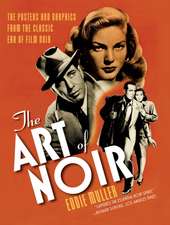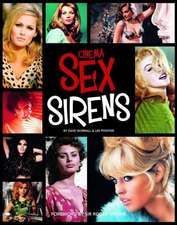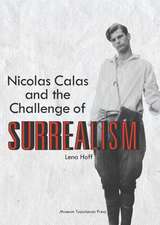Film and Television Genres of the Late Soviet Era
Autor Alexander Prokhorov, Elena Prokhorovaen Limba Engleză Paperback – 30 noi 2016
| Toate formatele și edițiile | Preț | Express |
|---|---|---|
| Paperback (1) | 192.19 lei 3-5 săpt. | |
| Bloomsbury Publishing – 30 noi 2016 | 192.19 lei 3-5 săpt. | |
| Hardback (1) | 831.52 lei 6-8 săpt. | |
| Bloomsbury Publishing – 30 noi 2016 | 831.52 lei 6-8 săpt. |
Preț: 192.19 lei
Preț vechi: 223.07 lei
-14% Nou
Puncte Express: 288
Preț estimativ în valută:
36.78€ • 39.33$ • 30.66£
36.78€ • 39.33$ • 30.66£
Carte disponibilă
Livrare economică 28 martie-11 aprilie
Preluare comenzi: 021 569.72.76
Specificații
ISBN-13: 9781441134288
ISBN-10: 144113428X
Pagini: 240
Ilustrații: 30 bw illus
Dimensiuni: 152 x 229 x 28 mm
Greutate: 0.38 kg
Editura: Bloomsbury Publishing
Colecția Bloomsbury Academic
Locul publicării:New York, United States
ISBN-10: 144113428X
Pagini: 240
Ilustrații: 30 bw illus
Dimensiuni: 152 x 229 x 28 mm
Greutate: 0.38 kg
Editura: Bloomsbury Publishing
Colecția Bloomsbury Academic
Locul publicării:New York, United States
Caracteristici
The first full study of this period of Soviet filmmaking and television output
Notă biografică
Alexander Prokhorov is Associate Professor of Russian and Film Studies at the College of William and Mary, USA. He is the author of Inherited Discourse: Paradigms of Stalinist Culture in Literature and Cinema of the Thaw (2007).Elena Prokhorova is Associate Professor of Russian and Film Studies at the College of William and Mary, USA. Her articles have appeared in Slavic Review, Slavic and East European Journal, Kinokultura, and edited volumes.
Cuprins
Table of Contents:AcknowledgementsIntroduction0.1. Approaches to Film and Television Genres0.2. Why Television?0.3. The Difficult Fate of Genre Studies in the USSR and Russia0.4. Overview of Chapters: from Socialist Realism to Film Genres Chapter 1. Epic Film as a Tool of Hard and Soft Power during the Cold War.1.1. Syntax and Semantics of the Genre1.2. War and Peace: Art Cinema on State Service1.3. Liberation: War Spectacle and the Politics of Memory1.4. Postscriptum: The Revival of Prestige Productions under Putin Chapter 2. The Socialist Television Police Procedural of the 1970s and 80s: Teaching Soviet Citizens How to Behave.2.1. Syntax and Semantics of the Genre2.2. The Investigation Is Conducted by Experts: The Soviet Police Procedural Is Born2.3. The Meeting Place Cannot Be Changed: The Romantics of Criminal Underworld2.4. Postscriptum: Streetwise Cops Meet the Russian Mafia Chapter 3. Late-Soviet Comedy: Between Rebellion and the Status Quo.3.1. Syntax and Semantics of the Genre3.2. El'dar Riazanov: The Trappings and Traps of Private Life3.3. Mark Zakharov's Television Films: Between the Romance and the Sitcom3.4. Postscriptum: The Living and the (Un)Dead Chapter 4. Reinventing Desire: Late-socialist Melodrama4.1. Syntax and Semantics of the Genre4.2. Television Melodrama4.3. Cinematic Masculinities4.4. Late-Soviet Woman's Film4.5. Postscriptum: Televised Passions ConclusionBibliographyFilmographyIndex
Recenzii
Alexander Prokhorov and Elena Prokhorova have written an excellent, highly informative, analytically deep, and lucid book that will impact the field with exponentially increasing force. They have laid the foundation for a new conceptualization of late Soviet cinema, TV, and culture in general. Their definitions and descriptions of late Soviet cinematic and TV genres offer an arsenal of tools that can be applied to other works, spheres, and periods of Russian cinema and culture in general.
Thorough, engaging, and easy to read, Film and Television Genres of the Late Soviet Era brings a much needed corrective to our notions of late Soviet cinema. The book ably addresses the different genres that characterize Soviet cinematic and televisual production of the Brezhnev era, moving beyond notions of Socialist Realism or "stagnation" to demonstrate the ways in which Soviet cinema and television adapted Western cinematic genres, while at the same time, developing their own specific cinematic and televisual language. The book's strengths lie in its ability to closely engage with both film and television, drawing connections between them without sacrificing media specificity, as well as to extend the analysis of genre and form to recent film and television productions. Film and Television Genres of the Late Soviet Era is the first book to thoughtfully address the late socialist period and the first to provide a thorough analysis of Soviet genre film. It will become standard reading for anyone interested in Soviet cinema after 1968.
If you want to understand a particular cultural moment after World War II, you have to know the television that people were watching (or not watching). If you want to understand late Soviet and post-Soviet television, you have to read the Prokhorovs.
A thorough, insightful, and groundbreaking analysis of late Soviet genres in both film and television that provides an historical overview of the topic (and its theoretical underpinnings) as well as discerning discussions of such genres as the prestige film, the police procedural, the comedy, and the melodrama.
Thorough, engaging, and easy to read, Film and Television Genres of the Late Soviet Era brings a much needed corrective to our notions of late Soviet cinema. The book ably addresses the different genres that characterize Soviet cinematic and televisual production of the Brezhnev era, moving beyond notions of Socialist Realism or "stagnation" to demonstrate the ways in which Soviet cinema and television adapted Western cinematic genres, while at the same time, developing their own specific cinematic and televisual language. The book's strengths lie in its ability to closely engage with both film and television, drawing connections between them without sacrificing media specificity, as well as to extend the analysis of genre and form to recent film and television productions. Film and Television Genres of the Late Soviet Era is the first book to thoughtfully address the late socialist period and the first to provide a thorough analysis of Soviet genre film. It will become standard reading for anyone interested in Soviet cinema after 1968.
If you want to understand a particular cultural moment after World War II, you have to know the television that people were watching (or not watching). If you want to understand late Soviet and post-Soviet television, you have to read the Prokhorovs.
A thorough, insightful, and groundbreaking analysis of late Soviet genres in both film and television that provides an historical overview of the topic (and its theoretical underpinnings) as well as discerning discussions of such genres as the prestige film, the police procedural, the comedy, and the melodrama.
Descriere
A brilliant overview of the film and television of the Soviet Union in the Stagnation period, shedding new light on the culture of the era.
